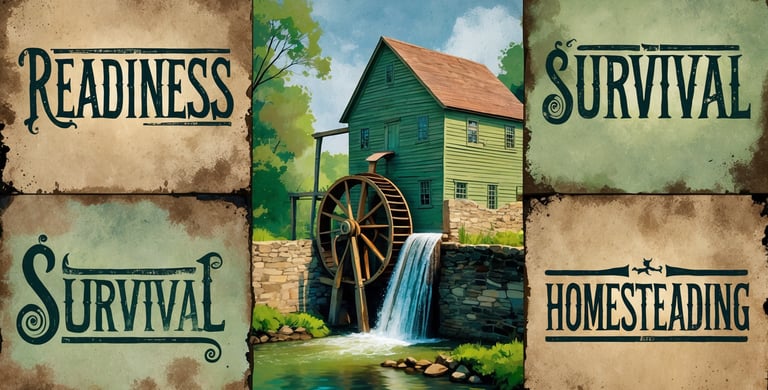Readiness: Family Readiness
Training Wives, Children, and Households Without Fear or Fanaticism
4FORTITUDER - READINESS, SURVIVAL, PREPAREDNESS, HOMESTEADING
Readiness: Family Readiness
Training Wives, Children, and Households Without Fear or Fanaticism
“A wise man leaves an inheritance to his children's children.”
— Proverbs 13:22
If They Panic, You Failed
Your readiness is not real until your household can act without you. The stocked pantry means nothing if your wife doesn’t know how to rotate supplies. The firearm is dead weight if your teenager is paralyzed by fear. A man’s home is not only his castle—it is his command post.
And a command post with untrained operators collapses under pressure.
Eastern wisdom teaches: “Govern the family as you would cultivate a field—prepare the soil, guide the growth, protect the roots.” Family readiness is not militarizing your home. It’s dignifying your people with the tools and confidence to stand when you’re not there to lead.
Core Knowledge Foundation: Readiness as a Household Culture
Family readiness is the gradual, intentional training of those under your care to respond, recover, and reinforce under stress. It includes practical knowledge, emotional conditioning, and clarity of roles.
Foundational Elements:
Household SOPs (Standard Operating Procedures): Everyone knows what to do for fire, power outage, injury, or intruder.
Layered Responsibility: Age-appropriate tasks and training—children as observers, teens as apprentices, spouse as co-leader.
Routine Exposure: Regular drills, weekend gear checks, shared prepping projects, and post-movie scenario discussions.
Misconception Warning: Readiness doesn’t require turning your house into a bunker. It requires turning it into a school of strength.
Advanced Insights: Overcoming Resistance with Love, Not Lectures
Some men falter here. They prepare in silence. Their families remain in the dark—until one day, they spring the plan. Fear follows. Resistance. Doubt. Or worse—mockery.
Why? Because they led with commands, not clarity.
Historical Anchor: The American Frontier Homestead
On the frontier, survival was a family affair. Children knew how to defend the animals, store the grain, spot threats. Women managed water, weapons, and wounds. The strength of the man was reflected in the competence of his household. Weakness meant death. But strength wasn’t fear-based—it was normalized through daily action.
You must bring readiness into the routine, not just the rhetoric.
Tactical Drill:
Each Sunday, assign a 30-minute family readiness project:
Teach how to use a fire extinguisher
Run a 60-second evac drill
Review one emergency location or supply station
Teach how to handle a home defense tool
Keep it light. Keep it serious. Keep it consistent.
Critical Perspectives: The Twin Traps of Fear and Fantasy
Adversarial Viewpoint:
“Training your family like soldiers instills fear or obsession. Let kids be kids. Let wives focus on what matters. Preparedness creates paranoia.”
Response:
What creates fear is uncertainty, not training. What causes panic is ignorance, not awareness. When readiness becomes a normal part of life—not an obsession, not a sermon, but a discipline—it becomes a form of love. It says: “I trust you with this. I honor you enough to train you.”
Wisdom and Warning Duality
When Followed: Your family moves as a unit. In crisis, they don’t look for orders—they follow embedded patterns.
When Ignored: You become the single point of strength. And if you fall, the rest fall with you.
Strategic Crossroad: Will your house be ready because you prepared it—or weak because you protected it from the truth?
Final Charge & Implementation
Brother, your strength must be shared. Not diluted—distributed. That’s what fathers do. That’s what husbands build. Not an empire of fear—but a domain of confidence.
Start Now:
Create a Household Readiness Schedule
“Wisdom lives in rhythm.” — Domestic Doctrine
One skill, one topic, one practice per week. Rotate roles. Keep it humble. Keep it holy.Assign Crisis Roles Now—Not During Crisis
“In the fog of war, roles save lives.” — Field Manual
Decide who watches the younger children. Who handles gear. Who drives. Who defends. It’s not sexist to assign. It’s negligent to delay.
Strategic Reflection:
Could your family execute a plan without you? Or are you the bottleneck to their survival?
Existential Challenge:
Have you trained your household to endure without you—not because you expect to fall, but because you refuse to let them fall with you?
Readiness is generational. Build it as a legacy, not a liability. Your family is not your burden—they are your brigade.
“A house becomes a fortress not through walls, but through people trained to stand when the ground shakes.”


